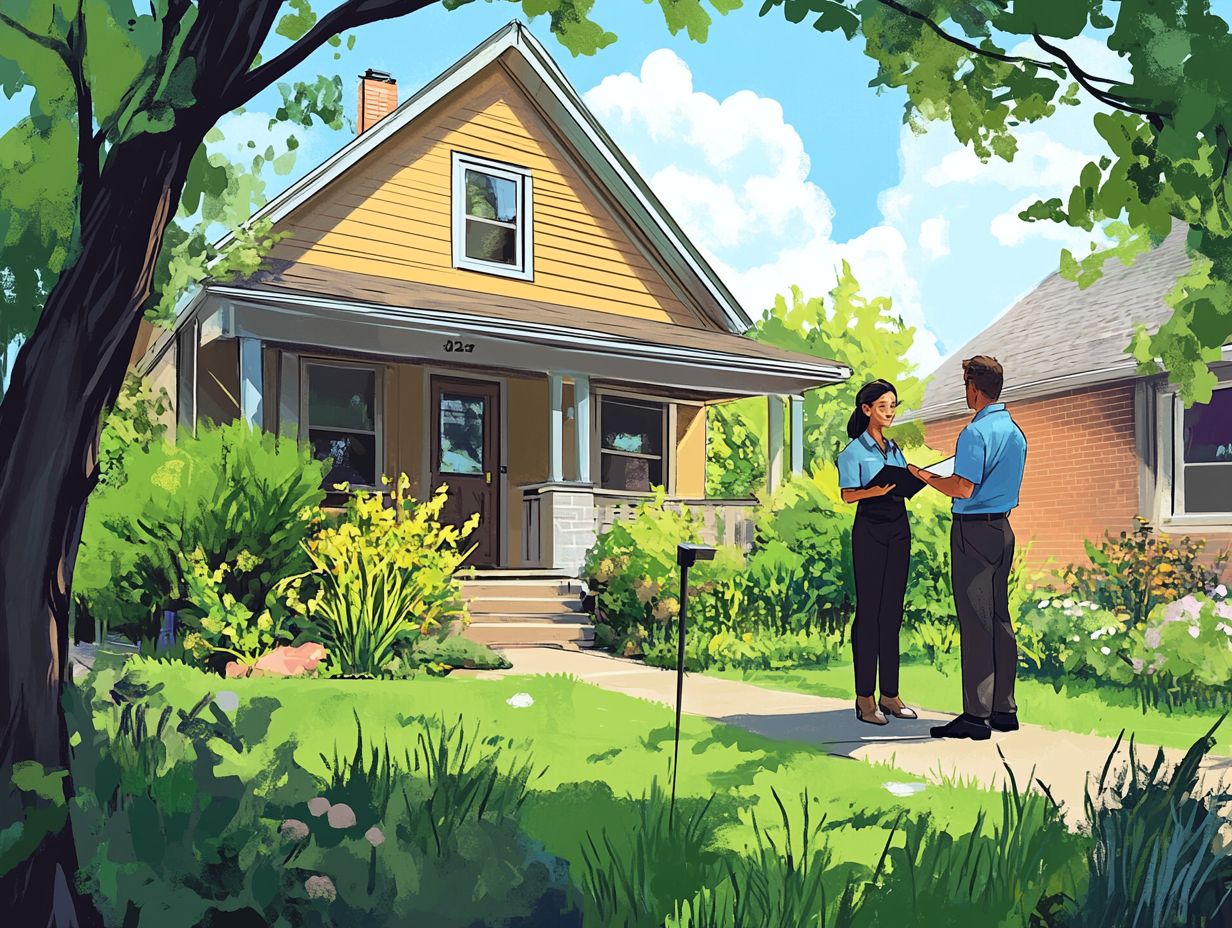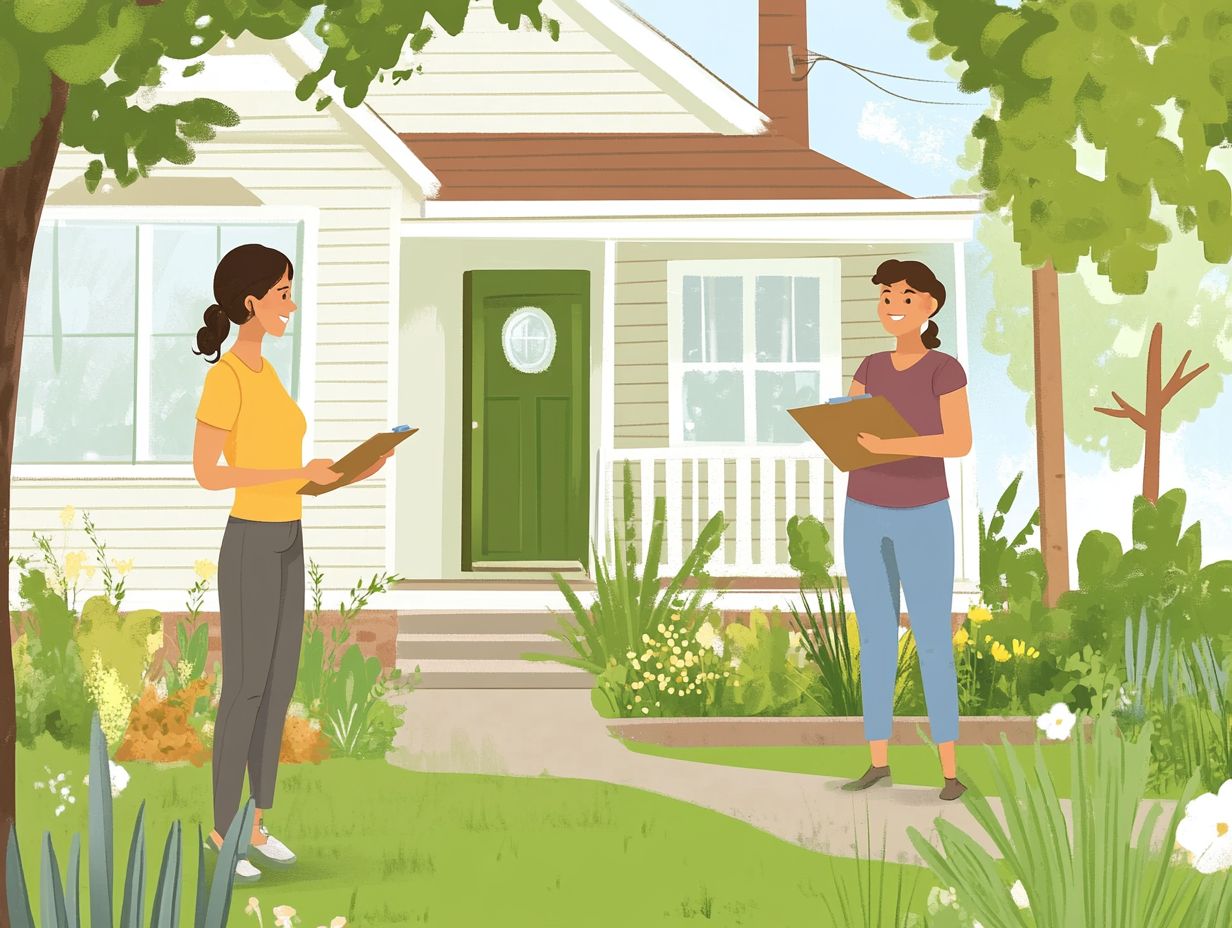How to Ensure Your Home is Properly Insured
Navigating the realm of home insurance may feel daunting, but understanding how it works is crucial for protecting your investment.
This article breaks down the essential components of homeowners’ insurance coverage. You ll learn about the various types and what they encompass.
You’ll also learn how to assess your home’s value and determine the optimal amount of coverage to shield against unforeseen events.
This article guides you to select the right provider and enhance your coverage with additional options. Regularly reviewing and updating your policy is important to ensure it aligns with your evolving needs.
Get the information you need to make well-informed decisions about your home insurance!
Contents
Key Takeaways:

Understand the different types of homeowners’ insurance coverage available and what they include. Ensure you have the right protection for your home and belongings.
Assess your home’s value and the factors that affect insurance costs. You can learn more about determining the appropriate amount of coverage to avoid overpaying or being underinsured with this guide on how to protect your home from theft and insurance claims.
Choose a reputable insurance provider. Consider factors such as customer reviews and financial stability to ensure you have reliable coverage in case of a claim.
Understanding Homeowners’ Insurance Coverage
Understanding homeowners’ insurance coverage is essential. It serves as a vital safety net for property damage and financial protection against unexpected events.
Homeowners’ insurance typically includes various types of coverage. This includes liability protection that shields you from legal claims.
Property damage coverage ensures your home and belongings are safeguarded against natural disasters, theft, and other risks.
By staying informed about coverage gaps and your specific insurance requirements, you can tailor your homeowners’ policy to fit your unique needs. For guidance on this process, check out how to understand your home insurance policy. This ensures that you have robust protection for both your home and personal possessions.
Types of Coverage and What They Include
Homeowners’ insurance encompasses various coverage options designed to protect your home and belongings from risks.
Whether it s safeguarding against natural disasters like hurricanes or offering protection in the event of theft or vandalism, this insurance is essential for every homeowner.
Dwelling coverage focuses on the physical structure of your home. It ensures that the costs for repairs or rebuilding are covered should unforeseen events arise.
Personal property coverage replaces stolen or damaged items, covering everything from electronics to furniture.
Liability coverage provides financial protection if someone is injured on your property. It shields you from potential legal costs.
Together, these coverages create a robust safety net, enabling homeowners to navigate unpredictable challenges with confidence.
Assessing Your Home’s Value
Evaluating your home’s value is essential for determining the right amount of homeowners’ insurance coverage. This assessment directly influences your insurance premiums.
A precise valuation considers factors like current construction costs, inflation rates, and overall property market trends. By doing this, you protect yourself from being underinsured during a claim.
By understanding the true worth of your home and its unique features, you can make informed decisions about your insurance policy, including how to find the best home insurance for your needs. This helps maintain robust financial protection.
Factors that Affect Insurance Costs
Several factors can profoundly impact insurance costs for homeowners. These range from the location of your home to the materials used in its construction.
For example, a history of claims can lead to increased premiums, indicating a higher risk to insurers. Components like the age of your home, the quality of building materials, and features such as a swimming pool or security system can affect your insurance costs.
Think carefully about these factors when choosing your insurance policy. This way, you can find a balance between manageable premiums and solid protection, ensuring your investment is well safeguarded against unforeseen events.
Take control of your home insurance today!
Determining the Right Amount of Coverage

Determining the ideal amount of homeowners insurance coverage is crucial for ensuring your financial protection against property damage or loss, and understanding what every homeowner should know about insurance can help you make informed decisions.
Consider options like replacement cost versus actual cash value.
It’s important to thoughtfully assess your needs and assets. This includes potential home repairs and renovations, as well as any outstanding mortgage insurance, to establish the right coverage levels. For tips on this process, learn how to prepare for home insurance inspections.
This evaluation is vital for your peace of mind. It also protects your financial future from unexpected events.
Calculating Replacement Costs
Calculating replacement costs is an important step in determining your homeowners insurance coverage. This ensures that, in the event of a disaster, you can restore your home to its original state without financial strain.
To arrive at an accurate figure, consider several essential factors. These include the current building costs in your area, the specific features of your home, and local construction trends.
For example, understanding the variations in labor and material costs can significantly influence your overall estimate. Make sure to consider any renovations or unique features of your property that might need special materials. This will help you avoid financial surprises down the road!
Getting these calculations right is crucial, as they directly affect the level of insurance coverage necessary to adequately protect against potential losses. Ultimately, this ensures you have peace of mind during uncertain times.
Choosing the Right Insurance Provider
Choosing the right insurance provider is an important decision for homeowners. It significantly influences the quality of service and coverage you receive. This choice affects everything from the claims process to your policy rates.
It s essential to compare various insurance quotes and assess crucial factors, such as coverage gaps, customer service reputation, and the expertise of the insurance agents involved.
By selecting a reliable insurance provider, you can ensure that your homeowners insurance policy is tailored to meet your unique needs. This grants you the peace of mind you deserve.
Factors to Consider
When selecting an insurance provider, consider several critical factors that can influence your overall satisfaction and financial security.
First, policy rates are crucial, as they directly affect your monthly budgeting while ensuring you don’t skimp on essential coverage. Examine the claims history of potential providers. This reveals how consistently they support their clients during tough times.
Coverage levels are just as vital, determining the extent of protection available for various scenarios, from natural disasters to personal property loss. Finally, don’t underestimate the importance of customer service reputation; responsive and knowledgeable support can truly make a difference during the often-stressful claims process. This ensures you feel understood and supported when you need it most!
Maximizing Your Coverage
Maximizing your homeowners insurance coverage is essential! To ensure you’re fully prepared, check out this guide on how to prepare for a home insurance inspection. It protects you against risks and secures your investment.
You can achieve this by exploring various additional coverage options tailored to your unique needs, such as:
- Fire protection
- Coverage for valuable personal possessions
By thoughtfully enhancing your policy and leveraging potential insurance discounts, you can boost your coverage levels while keeping it affordable.
Additional Coverage Options

You can enhance your insurance policy by exploring various additional coverage options.
These options provide protection beyond the standard homeowners insurance provisions.
Consider options like personal property coverage to ensure your valuable possessions everything from electronics to jewelry are secure in the event of theft or damage.
Liability coverage is another essential safeguard. This protects you if someone is injured on your property and offers you invaluable peace of mind.
If you live in a high-risk area, natural disaster insurance becomes particularly important. It helps cover the costs associated with damages from events like floods, earthquakes, or hurricanes.
These choices not only strengthen your property protection but also lighten the financial load of unexpected incidents.
Reviewing and Updating Your Policy
Regularly reviewing and updating your homeowners insurance policy is essential for maintaining financial protection as your needs and circumstances change over time.
Significant shifts in home value, coverage needs, or additional living expenses should trigger a full review of your coverage to uncover any potential gaps that may have developed.
By being proactive and well-informed, you can learn how to update your home insurance policy to accurately reflect current conditions, ensuring that your home assets remain well-protected.
When and Why to Update Your Coverage
Understanding when to update your homeowners insurance coverage is essential for safeguarding your financial well-being, especially after significant changes to your home or personal circumstances. Knowing how to prepare for a home insurance renewal can help ensure your coverage remains adequate.
If you embark on renovations that elevate the value of your property like adding a new room or upgrading the kitchen you should definitely reassess whether your current policy adequately reflects these enhancements.
Changes in your personal life, such as welcoming a new family member or launching a home-based business, may require a thorough evaluation of your coverage.
If you undertake major repairs, ensuring your policy aligns with the current market value is crucial to avoid any gaps in protection.
By aligning your homeowners insurance with these evolving needs, you not only comply with coverage requirements but also gain invaluable peace of mind.
Frequently Asked Questions
What does it mean to have proper home insurance?
Having proper home insurance means that your home and its contents are fully protected against potential risks such as fire, theft, and natural disasters. To ensure you have adequate protection, it’s important to know how to evaluate your home insurance needs. It provides financial coverage for unexpected events that may cause damage or loss to your property.
What Coverage Should I Consider for My Home?

The most common coverage options for home insurance include dwelling coverage, personal property coverage, liability coverage, and additional living expenses coverage. It is important to review and understand these options to ensure that your home is properly insured.
How much coverage do I need for my home?
The amount of coverage you need for your home depends on various factors such as the size and value of your home, the cost of rebuilding it, and the value of your personal possessions. It is recommended to consult with your insurance provider to determine the appropriate coverage amount for your specific needs.
Can I adjust my coverage over time?
Yes, you can adjust your coverage over time. It is important to review your insurance policy regularly and make necessary changes to ensure that your coverage adequately reflects any changes in the value or contents of your home. Your insurance provider can assist you in making these adjustments.
Are there any discounts available for home insurance?
Yes, many insurance companies offer discounts for various reasons, such as having a security system, bundling your home insurance with other policies, or having a good claims history. Be sure to ask your insurance provider about any available discounts to lower your insurance premium.
What Should I Do in Case of a Claim?
You must contact your insurance provider right away to tell them what happened. They will walk you through the claims process and help ensure your home is covered.
Be sure to document any damage with photos. Keep receipts for any expenses related to your claim.




